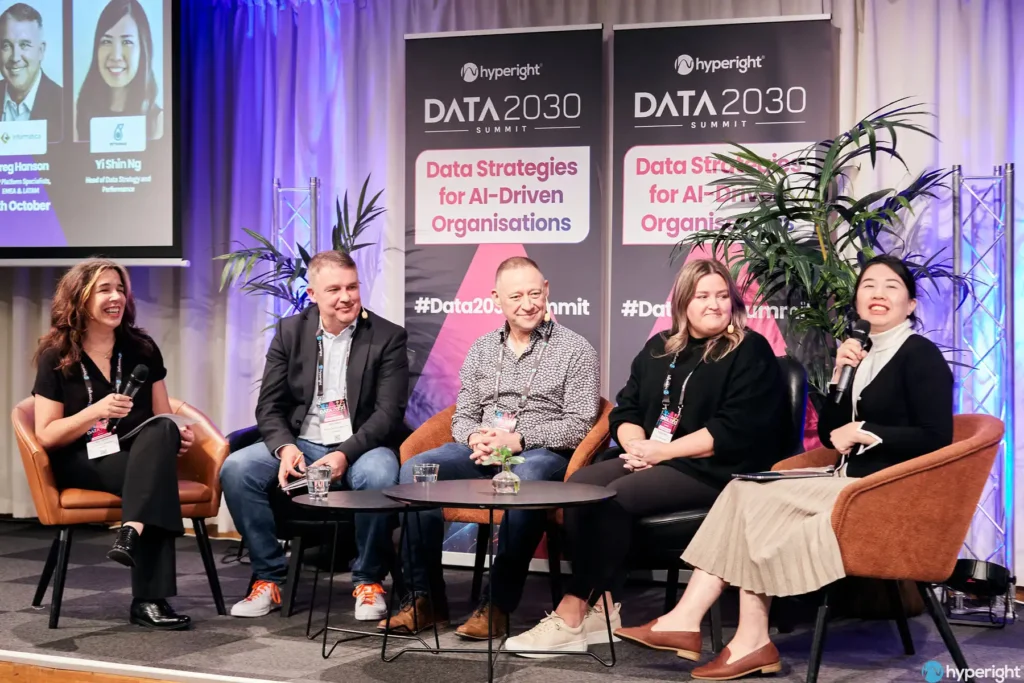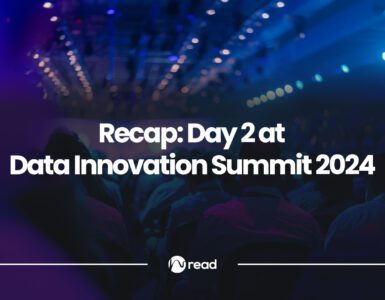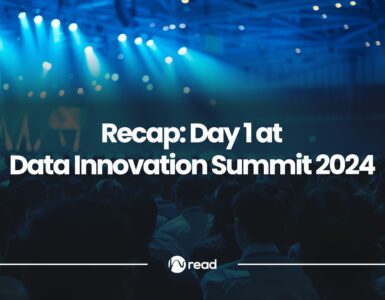In the world of data-driven business where change is the only constant, organizations across diverse industries are realizing something big: harnessing the power of data is no longer just a choice; it’s a strategic imperative. Beyond the fundamentals of data collection and analysis, they are now adopting a more nuanced approach aimed at creating distributed value.
What key factors contribute to the creation of value within an organization? How can we optimize it? How do we effectively align data strategies with regulatory compliance while fostering data democratization?
These are just a few of the questions explored in the panel discussion “From Data Strategy to Distributed Value Creation” at the Data 2030 Summit 2023. Data professionals came together to unlock new horizons and innovations, therefore shaping the future landscape of data in the years to come.


Led by Maria Ana Liz, Head of Data & Analytics Self Service at Ericsson, the panel featured industry experts including Alwyn Thomas from Financial Times, Karolina Perzon from Telia, Greg Hanson from Informatica, and Yi Shin Ng from PETRONAS. This diverse group of thought leaders shared their insights on the significance of data strategy in today’s digital landscape, along with practical tips for unlocking and maximizing value at all levels within an organization.
Exploring the Landscape of Enterprise Data Management
Panelists start their discussion by tackling the nuances of data strategy and its role in shaping the framework of AI and data-driven organizations. Alwyn Thomas emphasizes the need for a robust data infrastructure that can adapt to changing market demands. Moreover, Karolina Perzon highlights the importance of data literacy across organizational levels, suggesting that a culture of data-driven decision-making is fundamental to business success.
Greg Hanson discusses the technological aspects and focuses on the integration of advanced tools and platforms to streamline data processes. Followed by a unique perspective on performance metrics, Yi Shin Ng emphasizes how data strategy should align with the overall business objectives.
The speakers continue to tackle the challenges surrounding data privacy and security in the age of digital transformation. A key point among all panelists, is that, while leveraging data is key for value creation, it’s equally important to balance it with ethical considerations and compliance with global data protection regulations. As they wrap up the discussion, they share practical tips on how to measure value effectively.


Key Learning Takeaways
1. Adaptability of Data Infrastructure
The ability to quickly adapt and respond to new data sources, changing market trends, and technological advancements is crucial in today’s digital landscape marked by rapid transformations. The need for a flexible data infrastructure that can scale and evolve is real. This adaptability allows organizations to quickly integrate new technologies like artificial intelligence and machine learning, respond to emerging data privacy regulations, as well as leverage market opportunities for strategic growth.
For any organization, the agility of its data infrastructure directly impacts its ability to innovate and stay competitive. A rigid system can hinder growth and slow down response to market changes. Adaptability in data infrastructure ensures that an organization can be proactive rather than reactive, leveraging data insights for strategic decision-making and maintaining a competitive edge.
2. Data Literacy across the Organization
Data literacy is a crucial skill set, goes beyond the limits of data scientists and IT professionals. Its widespread integration spans across the entire organization, fostering a culture where insights drive success. Fostering a culture where every employee understands and can make data-driven decisions involves training and development programs, and creating an environment where data-driven decision-making is the norm. When every individual within an organization has a profound understanding of data and its implications, it paves the way for elevated decision-making across all hierarchical levels.
This collective data literacy is crucial for aligning individual objectives with the overall business strategy, culminating in a more cohesive and effective operational framework. Furthermore, it empowers employees by fostering a culture of innovation and active participation in data-driven initiatives.
3. Technological Integration
The integration of advanced data tools and platforms is critical for effectively managing the vast volume, rapid velocity, and diverse variety of data generated within modern business environments. Leverage the power of cutting-edge technologies like AI, machine learning, cloud computing, and big data platforms, to optimize data processing and analytics capabilities, fostering enhanced efficiency, improved analytics, and more accurate predictions.
Implementing advanced technological solutions empowers organizations to enhance the efficiency of data processing and analysis. This, in turn, leads to well-informed business decisions and strategic initiatives, while also contributing to the automation of routine tasks. This automation liberates human resources for higher-value strategic activities, ultimately diminishing the risk of human error in data handling.
4. Alignment with Business Objectives
It is imperative for an effective data strategy to seamlessly align with the organization’s objectives and goals. This strategic alignment is vital for ensuring that data initiatives contribute directly to the business’s bottom line and strategic direction. The panel underscored the importance of establishing clear goals for data initiatives, as well as consistently measuring their impact on business outcomes.
This alignment not only facilitates the optimization of resource usage but also makes it easier to showcase the Return on Investment (ROI) of data investments to stakeholders.
5. Balancing Value Creation with Data Ethics
In the pursuit of utilizing data for driving business growth, ethical considerations and compliance with data protection laws cannot be overlooked. The panel discussed the importance of ethical data usage, focusing on transparency, consent, and privacy. The need for organizations to act as responsible curators of customer data is crucial for skillfully balancing innovation with ethical considerations.
Ethical data practices build trust with customers and stakeholders, which is essential for long-term business success. Compliance with data privacy laws not only avoids legal repercussions but also demonstrates a commitment to ethical standards. This balance maintains a positive brand image and customer loyalty in the increasingly data-conscious world.


In Summary
The discussion on the panel “From Data Strategy to Distributed Value Creation” at the Data 2030 Summit 2023 unveiled diverse perspectives, each offering a unique viewpoint of how data shapes modern enterprises. It truly illustrated how essential data is in guiding the direction of modern businesses. The strategic approach to data management emphasizes adaptability, literacy, technological integration, alignment with business goals, and ethical considerations.
As organizations continue to navigate the challenges of the digital era, these insights serve as guiding principles for developing robust, effective, and ethical data strategies.
Immerse yourself in exclusive insights from industry experts and video presentations from the Data 2030 Summit, alongside a diverse array of other summits. Unlock the full potential with Hyperight Premium, to elevate your knowledge in the AI and data-driven world beyond limits.















Add comment